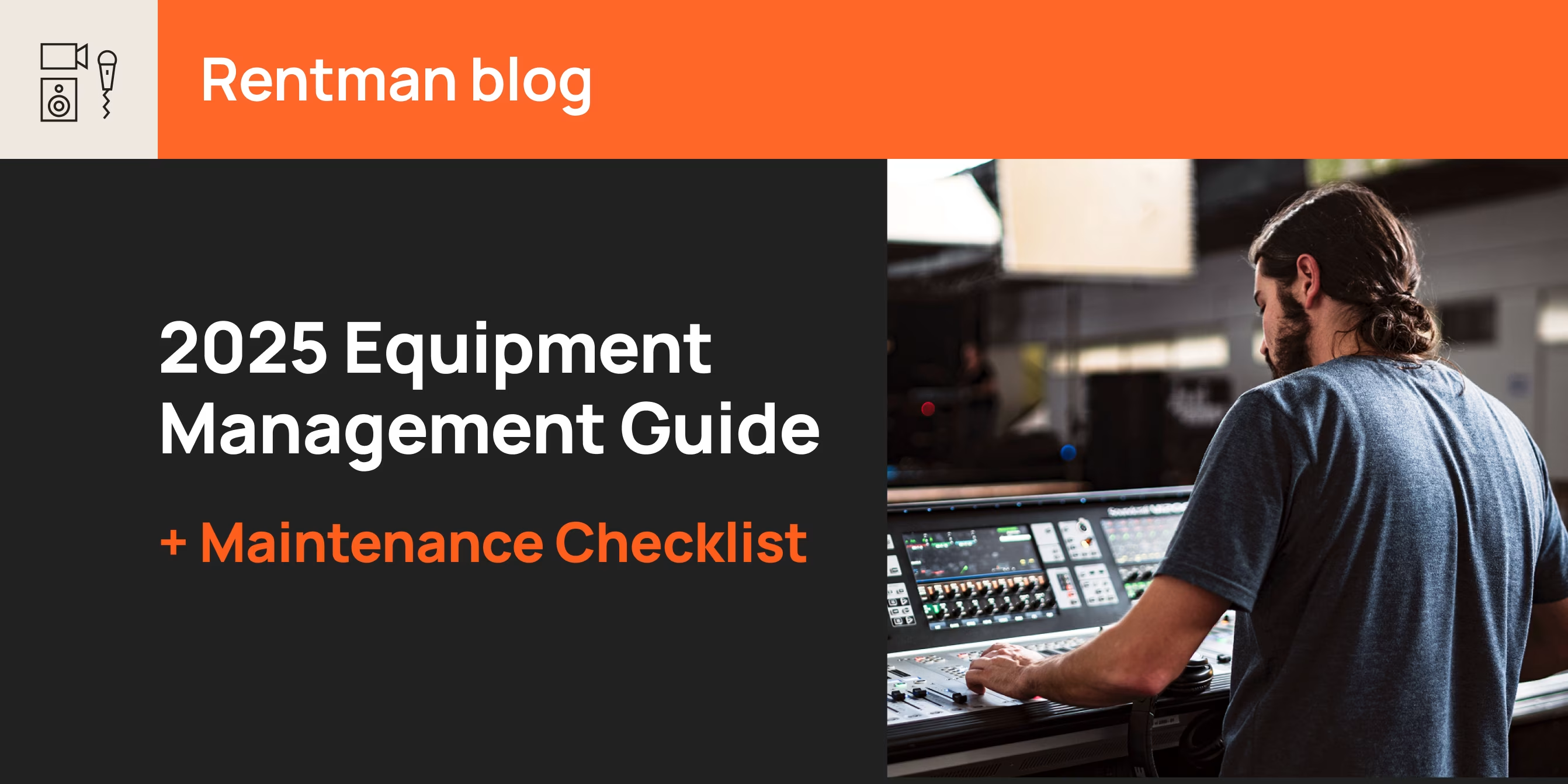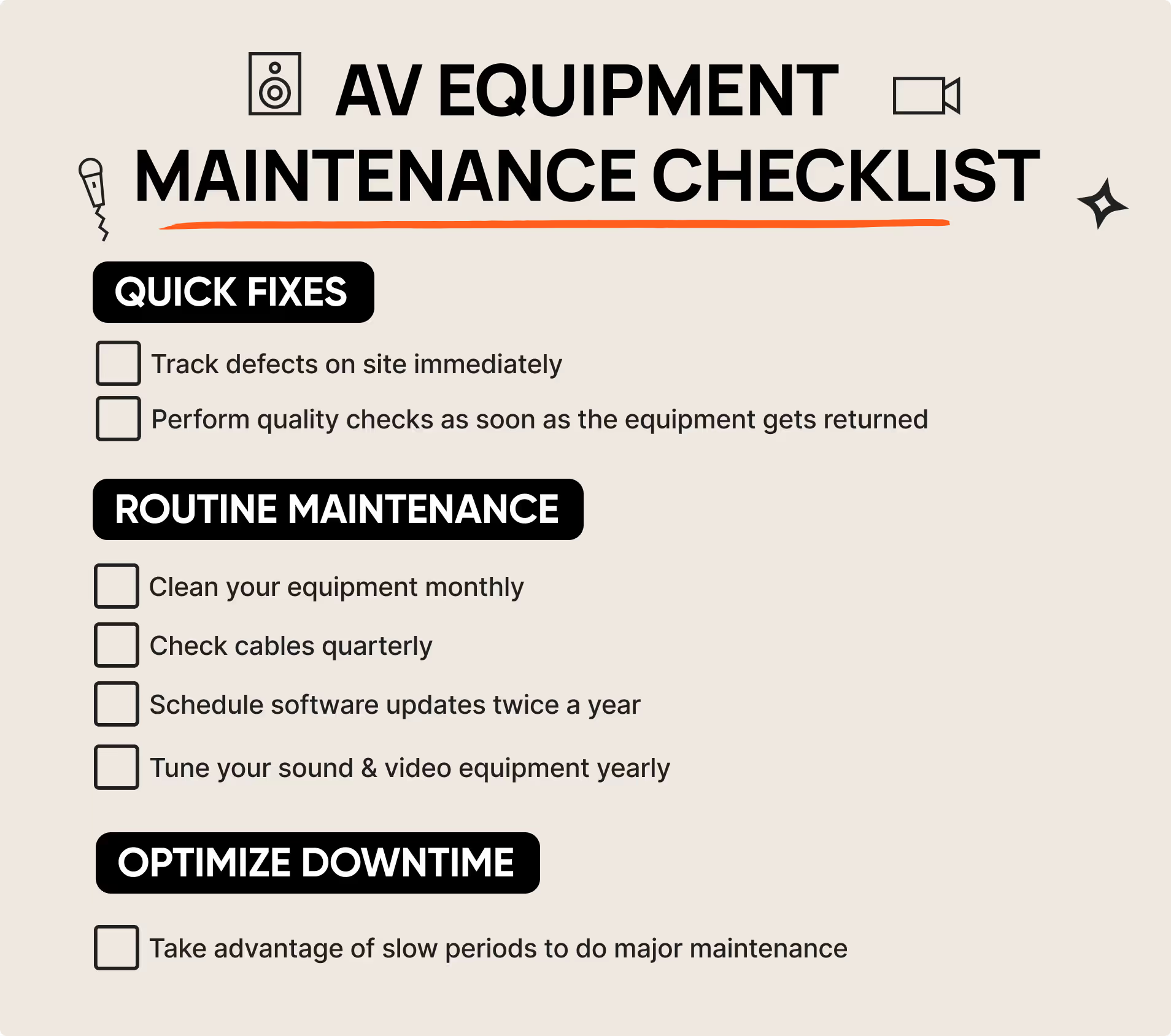2025 Equipment Management Guide: 5 Common Questions & Expert Solutions

Whether it’s high season, a slow period, or just ramping up, your equipment management skills are constantly put to the test. There’s nothing like juggling a busy warehouse with thousands of pieces of equipment and clients with high expectations. Feeling the pressure? There's always time to get on track.
With over 10 years of experience in the live events industry, including running his own rental company, freelancing as an AV technician, and using Rentman since 2013, Arjan Immeker has seen his fair share of challenges. Now a Domain Specialist at Rentman, he helps shape the platform based on real industry needs. So, we sat down with him to document the most common equipment management challenges and create this practical FAQ from which you can take inspiration.
1. What’s the ideal equipment planning window?
Arjan emphasized AV's golden rule regarding planning timelines: start early, stay ahead.
Start planning equipment at least 4-6 weeks before any event, especially for busy periods like summer festival season or corporate conference cycles. The extended lead time not only helps you with equipment availability but gives breathing room for thorough testing and agility if there are surprises before showtime. And there are always surprises.
Bonus tip: Don't plan what the client asks for; plan for what they need. Clients don't always know exactly which specific converter they'll need, or they might forget that an extra microphone or presenter will show up. That’s why it’s best to add spare critical items like backup adapters and extra cables from the start. That way, you can avoid last-minute issues and ensure a smooth outcome.
2. How do I make sure my equipment stays in top shape?
Regular maintenance is your insurance policy. Test everything, and stick to a consistent schedule. Arjan suggested a time-based checklist to keep you on track:

Bonus tip: And don’t forget to back up your work! This means having extra equipment ready, alternative setups prepared, and clear procedures in place for when things go wrong during events.
3. What are the best practices for handling equipment repairs?
Your crew is your first line of defense for repairs. Train them to handle equipment properly and tackle basic repairs. Good training prevents damage in the first place and saves you from calling expensive repair services for simple issues.
The key is building internal capability first, then having external support when you need it.
Bonus tip: Have a plan for when repair shops get busy. Always have backup repair contacts on hand, so you’re not dependent on a single resource. And keep track of which equipment breaks and when. If the same equipment keeps failing, stop throwing good money after bad. Just replace it.
4. How do I manage subrentals effectively?
If you do need some extra equipment, whether you're waiting on a repair or planning for a larger setup, subrentals can help you stay on track. Here’s what Arjan recommends:
- Do the math. Compare rental costs against potential revenue, including transportation and setup, and how often you rent the same equipment. Buying might be more cost-effective.
- Don’t compromise on quality. Inspect everything once you have it. Always work with reputable companies with whom you can build trust.
- Outline responsibilities. Make sure it’s clear who is responsible for repairs, backup plans, or last-minute changes. Always have it in writing, whether it’s yourself, the rental company, or the client.
5. What other technologies can I use to manage my equipment?
RFID is at the top of Arjan’s list of emerging technologies. It solves real visibility problems. When handling large volumes of stock or valuable equipment across multiple events, AV pros need to know exactly where everything is. And RFID does just that: it gives a complete inventory overview in an instant.
Another big advantage of using RFID is loss prevention, because it allows you to keep a record of when and where each item was last scanned. This makes it easy to create a recovery trail or create processes to prevent it from happening again.
Conclusion
Managing equipment doesn’t have to be overwhelming. With a bit of planning and the right systems in place, you can stay ahead of common issues and keep your events running smoothly.
And with the right Equipment scheduling product, you’ll be able to juggle any project that comes your way. Why not give Rentman a try? Your first 30 days are free.
